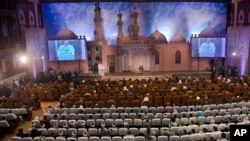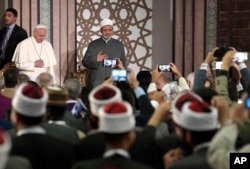Muslim and Christian religious leaders who gathered for an international peace conference in Egypt this week denounced terrorism in the name of religion.
The conference was held at a time when Egypt is suffering from a growing militant insurgency in parts of the country.
Addressing the peace conference hosted by the Al-Azhar University in Cairo, the oldest Islamic university – which has a national network of schools with around 2 million students - the university’s Grand Imam Dr. Ahmad Al-Tayyeb denounced preaching violence in the name of God.
“Some of the ayats [Quranic verses] I mentioned reveal the openness of this religion [Islam] towards other religions and respecting their beliefs, how could some classify Islam as a religion of terror,” asked Al-Tayyeb.
Al-Tayyeb called on militant extremists to stop using religion for achieving their goals and inciting religious hatred and violence.
The Grand Imam said, “Neither Islam nor Christianity nor Judaism are religions of terrorism, and terror acts perpetrated in their names are far from their core values.”
Pope Francis, who concluded a 27-hour visit to Egypt Saturday and addressed the conference, echoed Al-Tayyeb’s comments and emphasized the crucial role of religious leaders in exposing attempts to justify violence and hatred in the name of God.
“Religion, however, is not meant only to unmask evil; it has an intrinsic vocation to promote peace, today perhaps more than ever,” said Pope Francis, according to Radio Vatican.
Importance of context
Jaber Taee, Egypt’s deputy minister for Islamic Endowments, said in the conference that extremists and violent groups often take religious scriptures out of context in an effort to advance their agendas.
"Those who interpret Quranic verses and Sayings of the Prophet with an understanding in non-relevant contexts, that needs to be reviewed, they should review themselves," Taee told Alhurra TV.
The call for peace comes as the Egyptian government is facing an increasingly violent insurgency in the Sinai Peninsula.
Several militant groups, including Ansar Beit al-Maqdis - which has pledged allegiance to the Islamic State terror group - are controlling large swaths of territory in Sinai, which borders the Gaza Strip and Israel, and have established rule separate from the government in Cairo.
Islamic State militants in Sinai targeted Egyptian security forces and local Coptic Christians in the region, causing more than 100 Christian families to flee from the city of el-Arish to escape persecution recently.
Analysts charge that IS and other militant groups capitalize on the Egyptian regime's alienating policies towards the local tribes in Sinai.
"There seems to be a significant civil-military problem in the Sinai Peninsula. Unfortunately, the people who live there tend to regard the Egyptian government as a foreign occupying force," David Des Roches, a professor at the National Defense University in Washington, told VOA.
Roches added that the insurgency is gaining strength, partly because of the government's military tactics that have alienated the local population.
"If the problem of alienated people in Sinai were adequately adjusted by the Egyptian government, ISIS would not be a consideration," he said.
The locals accuse the government forces of indiscriminate bombing of their villages, as some militants hide among the local population and use them as human shields.





